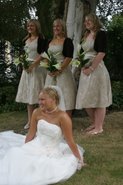No sooner had the winner of the X Factor been announced a few months ago than I saw a Twitter message by Steve Brookstein. ‘Who?’ you well may ask.
Steve won the competition six years ago and now, according to his recent message, was singing to twenty people in a coffee shop.
So as Matt Cardle sets off towards gaining his almost certain Christmas number one record spare a thought for all the forgotten winners whose dreams have been turned in to….well perhaps not nightmares, but you know what I mean!
Just think about other winners and runners-up; Andy Abraham, G4, Ray Quinn, Leon Jackson, and Rhydian Roberts. The memories are rushing back in.
In truth I remember very little about any of them.
Will the same fate be handed out to the latest winner Matt or will he gain international stardom along with the likes of Leona Lewis.
Just prior to the winner being announced we celebrated the 49th wedding anniversary of some very dear friends of ours. This quiet meal for a dozen friends could well have gone unnoticed by the other customers of the restaurants and yet for those involved it was a special occasion. Our happy couple are at an age where they too must go unnoticed by most of society. We tend to do this with age as if those with the most experience of life have nothing to offer the rest of us less experienced travellers.
The gentleman of our couple was one of the Ambulance heroes of the Bradford City fire all of those years ago. He doesn’t talk about it too freely but every now and then, when pressed, will tell a little of the trauma of that day and how so many people worked tirelessly to rescue those in greatest need.
Our time at the restaurant celebrating this precious couple seemed somewhat at odds with the celebrity culture honoured by programmes such as the X Factor.
Our ambulance hero has never sought the limelight as for many years he served his beloved Yorkshire, yet on one fateful Saturday in May his daily job became linked with the stuff of headlines.
The rest of who looked on back in 1985, hoping that our loved ones were not caught up in the blaze, will always remember the bravery of those who came to the rescue. Yet we do so without knowing their names for this is not the same remembering that is demanded by the celebrity culture. It is more important than that.
So as Steve Brookstein becomes a casualty of Simon Cowell’s fame machine its hard to have too much sympathy. He knew what he was getting in to and he must have known that it wasn’t really about music; it never is.
And as Matt Cardle’s new song hits the airwaves this Christmas lets take the time to remember some of the heroes in our locality who are all too easily forgotten.
I wonder what incredible stories we might uncover as we do. Perhaps there are other heroes of the Bradford fire who deserve the chance to be honoured by simply taking the time to listen to their stories. They had the X factor back then and, as we have found out with our dear friends, they still have the X factor now; it just isn’t about singing.
Come to think of it neither is the Simon Cowell version.
Heroes Needed
Posted by
Molineaux
0
comments
![]()
Labels: alan molineaux, four daughters, Four Daughters One Wife, Four Daughters One Wife and me, heroes, molineaux, x-factor
Middle Class Commoner
It's not very often these days I am made to feel aware of my social
class. This could be due to the general lack of awareness I have as to
my surroundings or it may be that life has changed so much that such
things no longer have any meaning.
There is, of course, the odd time that I drop an aitches in polite
conversation and find someone wanting to correct me. And every now and
then someone might make a comment about their school and I am distinctly
reminded that the variety I attended was the second class modern type.
It was as if they were training us to be working class. The careers
teacher actually laughed at me when I informed him that I wanted to
become a maths teacher. Instead he sent me off for an interview at a
local engineering works. I didn't get the job partly because he sent
every other boy to the same interview. The guy who took the interview
sounded decidedly middle class not that I was really aware of what
difference it made.
Now, as the newsreels have been resounding with the news of a royal
wedding, we are informed that the future royal, Kate Middleton, is in
fact middle class.
This may not come as a surprise other than the fact that her parents
are millionaires. Herein lies the problem; how do we decide what counts
as lower, middle, or upper class in an age of egalitarian aspiration.
I was born to working class parents in suburb or a northern town. I
never considered myself to be anything other than working class and yet
several decades later I became a manager in a large company. Perhaps
during this time my staff would have considered me a traitor to by roots
but somehow I felt just the same as I had did all those years ago.
So what is it that determines ones class? Your parents, your job, your
wealth, your accent, your postcode, your attitude, or the school you
attended.
Whatever it is I am sure that our newest royal has no control over it.
Either the media, or the Great British public, or both will decide and
pass judgement accordingly. One report not only described her as middle
class but also a commoner.
I was intrigued to find that on hearing the engagement announcement
that one TV news company commissioned a poll to discover what the rest
of us commoners thought about it. It informed us that 62% of us had no
opinion what so ever.
Perhaps that is the real test of whether you are a commoner; you don't
have a significant opinion on the royalty or who they should marry.
The poll did reveal that men out number women when it comes to such
apathy. My wife often tells me that my behaviour is a little common.
This could explain why I didn't get the engineering job; or indeed
become a maths teacher.
I take it that Her Royal Highness the Queen approves of William's
choice of bride despite her more humble status, so that should be good
enough.
In that respect she has a lot in common with Mrs M, who informs me that
she wouldn't have protested had one of our girls decided to marry a
prince. She is definitely not a commoner.
Posted by
Molineaux
0
comments
![]()
Good Companions
We had the pleasure of recently attending a performance at Bingley Little Theatre. I am sad to say that since we moved here in 2005 we have not paid a visit until now.
We were invited by our dear friend Doris along with a bunch of other friends.
I have to confess that it is the best part of two decades since I attended an am-dram production and so I had to become quickly accustomed to the feel of watching a live performance during which you can’t do many of the things you have become used to at home.
You know what I mean; arguing about who is going to put the kettle on, shouting at the TV when Simon Cowell destroys another one of the hopeless contestants on The X Factor, or pausing the programme whilst you nip to the loo.
Such behaviour is not allowed in the theatre it seems after all you can hardly ask the performance to wait a moment whilst you run to the toilet.
This being said Mrs M and I joined the other ‘theatre-goers’ (for that is what we now were) and took our seats to watch JB Priestly’s Good Companions.
It was the most enjoyable evening and I judged it as a triumph for a number of reasons; Firstly, within the first couple of minutes I had stopped seeing the performers as actors and believed them to be their characters. Secondly, the time went by so very quickly.
It was a great performance and an enjoyable experience; one which I hope to repeat again soon. I am slightly surprised that it has taken me so long to get there given the fact that I really enjoy community events, however large or small they may be.
It is tempting to think that only the larger well attended events can be considered as successful. Yet our towns and villages are filled with programmes that could be considered as insignificant to the rest of the world. In fact these moments act as the glue that holds our communities together.
Not too long ago I had the pleasure of celebrating the ninetieth anniversary of the Royal British Legion.
The Legion had organised an event in our local town centre to remember the great work that this organisation has done over the years.
It was a typical small town, British event. I say this not as a compliment. It had bands, and stalls, and food, and drink, and entertainment. Given that it was held in this country it also had rain.
Perhaps the organisers would have felt a little downhearted at the weather but the event was a success in so many other ways. They had managed to bring the community together and celebrated their excellent organisation’s anniversary.
Both occasions display what is best about our community; real people using their skills to provide a place for people to connect. For me this was a great antidote to the world view propagated by shows like the X-Factor.
I for one was glad to have attended both the play and the anniversary celebration. We made new friends at the Royal British Legion and we attended Good Companions with our own good companions.
Posted by
Molineaux
0
comments
![]()
Labels: alan molineaux, four daughters, Four Daughters One Wife, Four Daughters One Wife and me, molineaux







